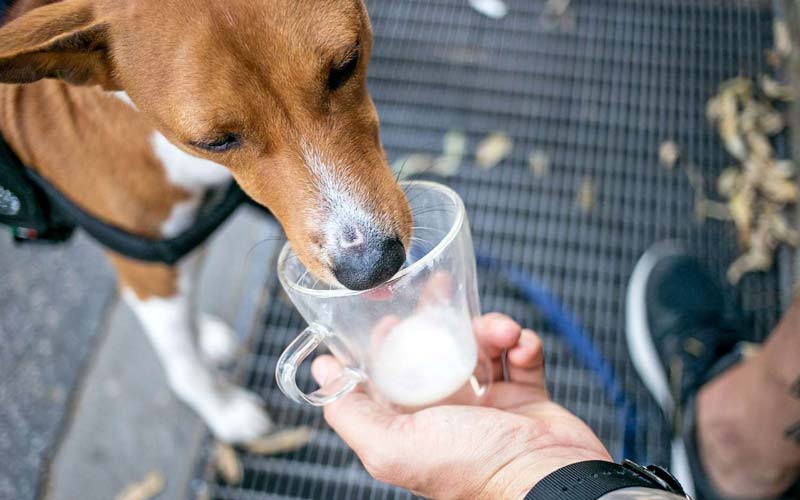As a responsible dog owner, you’re always on the lookout for new and healthy treats to keep your furry friend happy and well-nourished. With the growing popularity of plant-based diets, oat milk has become a staple in many households. But as you pour a glass of this creamy, dairy-free alternative, you might wonder—can dogs have oat milk? Is it safe, and could it offer any benefits to your pet’s diet?

In this article, we’ll explore whether oat milk is a suitable option for dogs, diving into its nutritional benefits and potential risks. We’ll also provide practical tips on how to safely introduce oat milk to your dog’s diet, ensuring that your pet enjoys the treat without compromising their health. Whether you’re curious or cautious, read on to discover everything you need to know about oat milk for dogs.
1. What is Oat Milk?
Oat milk is a popular plant-based beverage made by blending oats with water and then straining the mixture to create a smooth, creamy liquid. Known for its mild, slightly sweet flavor, oat milk has become a favorite dairy alternative for those who are lactose intolerant or prefer a vegan lifestyle. It’s also rich in essential nutrients like fiber, vitamins, and minerals, making it a health-conscious choice for many.
Given its nutritional profile and the fact that it’s free from common allergens found in dairy, some dog owners have started to consider oat milk as a treat for their pets. The appeal lies in its digestibility and the potential health benefits it could offer, especially for dogs with sensitive stomachs or lactose intolerance. However, it’s important to approach this option with a clear understanding of both its advantages and potential risks.
2. Is Oat Milk Safe for Dogs?
One of the key reasons dog owners might consider oat milk is its lactose-free nature. Many dogs struggle to digest lactose, the sugar found in dairy milk, leading to gastrointestinal issues like bloating, diarrhea, or gas. Oat milk, being naturally free of lactose, presents a safer alternative for dogs with lactose intolerance, allowing them to enjoy a milk-like treat without the discomfort.
The simplicity of oat milk’s ingredients—typically just oats and water—also makes it easy on a dog’s digestive system. Unlike dairy or nut-based milks, oat milk is less likely to trigger allergies or cause digestive upset, making it a gentler option for sensitive dogs.
However, it’s crucial to be cautious when selecting oat milk. Many commercial varieties contain added sugars, flavorings, or preservatives that can be harmful to dogs. Particularly dangerous is xylitol, an artificial sweetener found in some products, which is toxic to dogs even in small amounts. To ensure your dog’s safety, always choose plain, unsweetened oat milk without any additives.
3. Nutritional Benefits of Oat Milk for Dogs
Oat milk offers several nutritional benefits that can be advantageous to your dog’s health when given in moderation. It’s a good source of essential vitamins and minerals, particularly calcium and vitamin D, which are important for maintaining strong bones and teeth. These nutrients can be especially beneficial for older dogs or those with bone health concerns.
Another advantage of oat milk is its low allergen risk. Unlike cow’s milk, which contains proteins that can trigger allergic reactions in some dogs, oat milk is less likely to cause such issues. This makes it a suitable option for dogs with food sensitivities or those prone to allergies. Additionally, oat milk is a source of soluble fiber, which can aid in digestion and help regulate your dog’s bowel movements.
While oat milk can be a nutritious addition to your dog’s diet, it’s essential to remember that it should be treated as an occasional treat, not a staple. The nutrients found in oat milk can complement a balanced diet but should not replace the primary sources of nutrition your dog needs, such as high-quality dog food.

4. Potential Risks of Oat Milk for Dogs
While oat milk can be a healthy treat, it’s important to be aware of its potential risks, particularly when it comes to calorie content. Oat milk is relatively calorie-dense, which means that giving it to your dog in large quantities could contribute to unwanted weight gain. This is especially concerning for dogs that are prone to obesity or have a sedentary lifestyle. To avoid this, always serve oat milk in moderation, as an occasional treat rather than a regular part of your dog’s diet.
Another risk to consider is the presence of added sugars and additives in some commercial oat milk products. Many store-bought varieties contain sweeteners, flavorings, or preservatives that can be harmful to dogs. For example, xylitol, an artificial sweetener commonly found in some oat milk brands, is highly toxic to dogs and can cause severe health issues. It’s essential to read labels carefully and opt for plain, unsweetened oat milk without any added ingredients.
Finally, while oat milk is generally well-tolerated by most dogs, individual sensitivities can still occur. Some dogs might experience digestive upset, such as diarrhea or vomiting, after consuming oat milk, especially if they are not used to it. It’s important to monitor your dog closely after introducing oat milk to their diet and discontinue use if any adverse reactions are observed.
5. Tips for Introducing Oat Milk to Your Dog’s Diet
When introducing oat milk to your dog’s diet, it’s best to start small. Begin with a tiny amount to see how your dog reacts, both in terms of taste and digestion. If your dog enjoys the oat milk and shows no signs of digestive upset, you can gradually increase the serving size, always keeping it in moderation.
Checking the labels is crucial when selecting oat milk for your dog. Ensure that the product is unsweetened and free from any harmful additives, such as xylitol or artificial flavorings. The simpler the ingredients, the better it is for your dog.
For serving suggestions, consider mixing a small splash of oat milk into your dog’s water bowl or using it as a base for homemade dog treats. You can also pour a little over your dog’s regular food as a special treat. Whatever method you choose, always keep the portions small to prevent any potential health issues.
By following these tips, you can safely introduce oat milk into your dog’s diet, allowing them to enjoy the occasional treat while reaping the potential benefits.

Conclusion
Oat milk can be a safe and nutritious treat for dogs when given in moderation and with the right precautions. As a lactose-free option, it’s especially suitable for dogs with lactose intolerance, offering a digestible and gentle alternative to dairy milk. The nutritional benefits, such as calcium and vitamin D, can support your dog’s overall health, particularly when you choose plain, unsweetened oat milk free from harmful additives.
However, it’s important to remain mindful of the potential risks, including the calorie content and the presence of added sugars or artificial sweeteners in some commercial oat milk products. Always start with small amounts to gauge your dog’s tolerance and ensure it complements their balanced diet rather than replacing essential nutrients.
If you’re considering adding oat milk to your dog’s diet, consult with your veterinarian first to ensure it aligns with their specific health needs. By making informed choices and monitoring your dog’s response, you can safely introduce this plant-based option into their treat routine, enhancing their diet with a new and enjoyable flavor. Give it a try and observe how your furry friend reacts—they might just love this new, creamy treat!